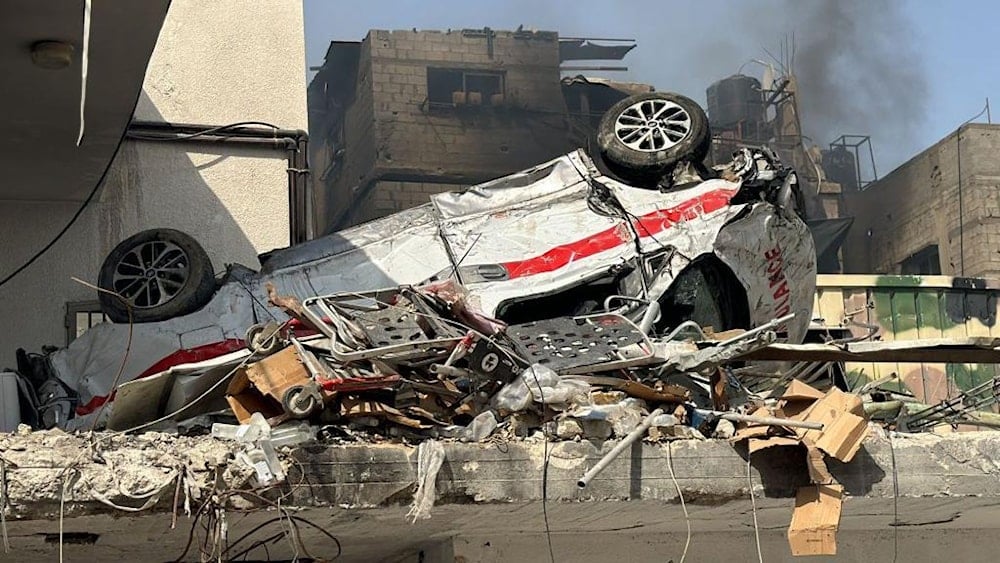Experts condemn Israeli attacks on medical facilities as healthocide
Academics urge that the rising attacks on hospitals and medical personnel, particularly the Israeli aggressions in Gaza, be dubbed "healthocide" as health care services in war zones continue to be active targets.
-

A damaged ambulance outside Kamal Adwan hospital in northern Gaza in October 2024 (AFP)
Targeted attacks on Gaza hospitals and healthcare workers in conflict zones have prompted global health experts to call for the new term to be used to describe the deliberate destruction of healthcare systems during war: "healthocide".
Amid "Israel's" ongoing aggression, health services in Gaza have faced unprecedented levels of violence and obstruction, with doctors and medical facilities increasingly targeted
Despite protections enshrined under international humanitarian law through the principle of medical neutrality, experts warn that healthcare systems are being systematically dismantled in areas of conflict.
"Both in Gaza and Lebanon, healthcare facilities have not only been directly targeted," Dr. Joelle Abi-Rached and colleagues wrote in a commentary published in the British Medical Journal at the American University of Beirut.
"Access to care has also been obstructed, including incidents where ambulances have been prevented from reaching the injured, or deliberately attacked,” the authors added, highlighting that medical personnel and facilities are no longer receiving the legal protections guaranteed during armed conflict.
Violations of medical neutrality in Lebanon and Gaza
According to data from "Israel’s" ongoing war on Gaza, at least 986 medical workers have been killed, according to The Guardian. Recent figures from the Healthcare Workers Watch report that 28 Palestinian doctors are currently detained in Israeli prisons without charge, including eight senior consultants across various specialties such as surgery, cardiology, and pediatrics.
The World Health Organization’s representative for the West Bank and Gaza reported to the UN Security Council in January that Gaza hospitals had "turned into battlegrounds” and that the entire healthcare system was "systematically dismantled and driven to the brink of collapse.”
Palestinian healthcare professionals detained by the Israeli military have recounted harrowing experiences, including physical torture, starvation, beatings, and psychological abuse. Many were denied access to food, water, hygiene, and rest.
In Lebanon, the Ministry of Public Health reported that from October 8, 2023 to January 27, 2025, 217 healthcare workers were killed by the Israeli occupation forces, 177 ambulances were damaged, and 68 attacks on hospitals were documented.
Israeli aggressions fuel health crisis in conflict zones
The Safeguarding Health in Conflict Coalition recorded 3,623 attacks on or obstructions of healthcare services globally in 2024, the highest figure ever documented.
These attacks included arbitrary arrest, torture, and killings of doctors and nurses; the targeting of patients within hospitals; and the deliberate bombing and raiding of healthcare facilities. The magnitude and frequency of these incidents represent an escalating medical crisis with dire humanitarian consequences.
The authors of the BMJ article called on medical professionals worldwide to abandon silence and challenge the erosion of medical neutrality, encouraging them to document abuses and advocate for the enforcement of humanitarian law.
Urgent calls for accountability and protection of healthcare
Maarten van der Heijden, a global health lawyer at the London School of Hygiene and Tropical Medicine, noted in The Guardian that the Geneva Conventions "leave considerable room for interpretation,” allowing some governments to justify targeting hospitals if deemed militarily advantageous.
Dr. Andrew Green, chair of the British Medical Association’s medical ethics committee, emphasized that Gaza’s situation is the most severe globally.
"The population is both at risk of imminent famine, while health systems necessary to look after the starving have been systematically obliterated and health workers killed and arbitrarily detained,” he said.
Green also urged global bodies, including international medical associations, NGOs, governments, and the UN, to confront these violations directly and call for accountability.
"Those with power must use all levers at their disposal to ensure the provision of humanitarian aid and urgent healthcare to the world’s most vulnerable. One clear step would be the establishment of a UN special rapporteur on the protection of health in armed conflict,” Green added.

 4 Min Read
4 Min Read










